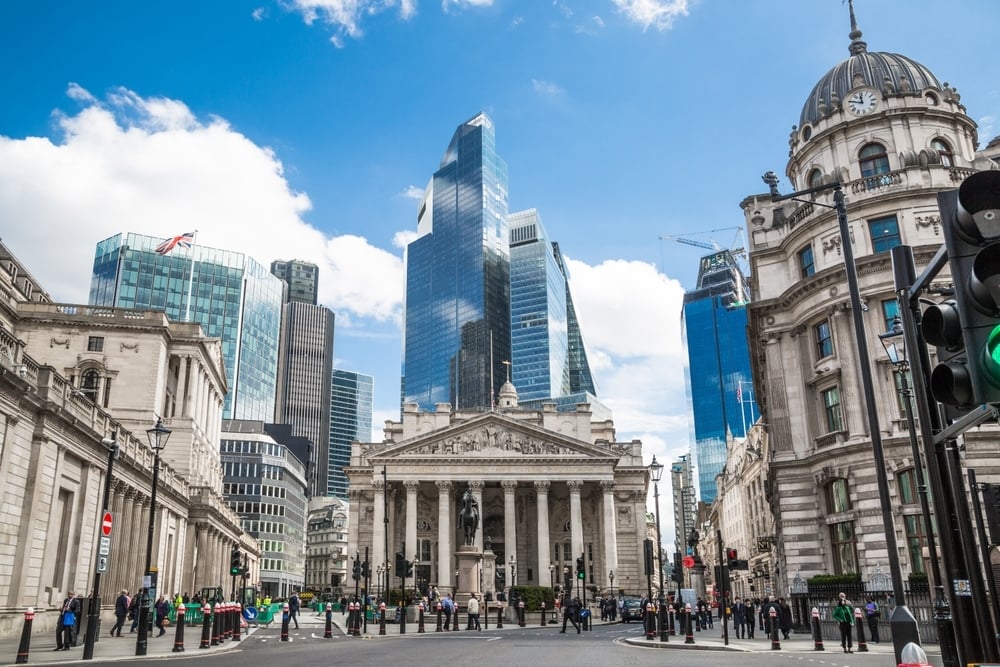Weekly Briefing: PE generates £137bn of UK GDP, JP Morgan acquires First Republic & UK Govt. borrowing is lower than expected
In this week’s briefing, we discuss the news that UK Government borrowing between April 2022 and April 2023 was £12.8bn lower than expected, despite helping consumers with the recent energy crisis. On a global scale, JP Morgan has acquired the majority of First Republic Bank, further cementing JP Morgan’s position as the largest lender in the US. In other news, more than 1,000 new investors have committed to the United Nations Principles for Responsible Investment (PRI), solidifying the data indicating that impact investing is further growing in scale.
UK economy
Government borrowing between April 2022 and April 2023 lower than expected, despite energy crisis
- The UK government borrowed less than expected in the financial year ending in April 2023, despite spending heavily on energy bills support and facing higher borrowing costs. The lower level of borrowing was largely due to better-than-expected economic performance.
- Borrowing was estimated at £139.2bn for the year, lower than the £152bn predicted by the Office for Budget Responsibility. This will give the Chancellor more room to “cut taxes or raise spending ahead of the next general election”, said Ruth Gregory of Capital Economics.
- When the government borrows less money, it has more fiscal space to invest in public services, such as healthcare, education, and infrastructure. This can lead to improved economic growth and productivity, as well as better living standards for the population.
- Furthermore, when the government borrows less money, it reduces the burden of debt that future generations will have to bear. This can help to ensure the long-term sustainability of the country's public finances and reduce the risk of a debt crisis.
- However, borrowing costs remain relatively high and the UK is set to be one of the worst performing major economies in the world this year, according to the International Monetary Fund.
- The ONS said public sector net debt at the end of March 2023 was £2.53tn, equivalent to around 99.6% of the value of the whole UK economy and a level not seen since the early 1960s. As a result, Chancellor Jeremy Hunt aims to “get debt falling” as a share of GDP by five years' time.
Global economy
JP Morgan acquires majority of failed First Republic Bank
- JP Morgan has won a competitive bid to take over the majority of First Republic Bank – a regional commercial bank and wealth management service provider headquartered in San Francisco.
- The £8.5bn deal was hurriedly brokered by US regulators after First Republic was temporarily taken over by the Federal Deposit Insurance Corporation (FDIC).
- The regulator is providing $50bn of financing and promising to share loan losses as part of a deal that further cements JP Morgan’s position as the largest lender in the US.
- First Republic experienced difficulties after customers recently withdrew more than $100bn in deposits following the collapse of Silicon Valley Bank (SVB), marking the second largest bank failure in US history.
UK tax update
Taxpayers given more time for voluntary National Insurance contributions
- The government has extended the voluntary National Insurance deadline to 31 July 2023 to give taxpayers more time to fill gaps in their National Insurance record and help increase the amount they receive in State Pension.
- This comes after members of the public voiced concern over the previous deadline of 5th April 2023.
- Thousands of taxpayers with incomplete years in their National Insurance record could be financially better off in their retirement if they make voluntary payments to top up any incomplete or missing years.
- Eligible taxpayers can find out how to check their National Insurance record, obtain a State Pension forecast, decide if making a voluntary National Insurance contribution is worthwhile for them and their pension, and how to make a payment on GOV.UK (taxpayers can check their National Insurance record via the HMRC app or their Personal Tax Account).
Impact investing
Over 1,000 additional investors commit to the United Nations Principles for Responsible Investment (PRI)
- The United Nations Principles for Responsible Investment (PRI) is a global initiative that aims to encourage responsible investing practices by institutional investors.
- In 2022, 1,069 additional investors committed to the PRI, increasing the total number of signatories to 4,167 and demonstrating the growing trend of investors adopting responsible investment practices.
- Moreover, the number of asset owners that became PRI signatories increased by 88 in 2022, bringing the total to 681. This suggests that institutional investors are increasingly interested in aligning their investments with sustainability goals and are integrating environmental, social, and governance (ESG) factors into their investment decision-making processes.
- The increase in signatories to the PRI reflects a growing awareness of the importance of impact investing, which seeks to generate positive social and environmental outcomes alongside financial returns. As more investors commit to the PRI, this can encourage companies to adopt sustainable practices and contribute to achieving the United Nations' Sustainable Development Goals.
How does climate change affect banks?
- In early 2023, the Federal Reserve Board outlined how it would conduct its pilot climate scenario analysis on the six largest US banks.
- According to a joint report issued by the Financial Stability Board (FSB) and Network for Greening the Financial System (NGFS) in November 2022, there were 67 climate scenario analysis projects completed, in progress or at the planning stage, compared to 29 in the report a year earlier.
- This shows that banks are allocating increased resources to study climate-related issues that could potentially pose a threat to the financial sector.
- Banks will play a major role in a successful climate transition, and the data gathered from these tests can be used to reduce downside risks by working to avoid losses related to climate change.
Venture capital
Many VC investors expect generative AI to drive significant opportunity over next 12 months
- In March 2023, PitchBook surveyed 58 VC investors to understand their attitudes toward technology and the VC ecosystem.
- The survey revealed that the VC community appears bullish on the impacts of AI, especially generative AI, and expects it to drive innovation and growth opportunities over the next 12 months.
- Furthermore, VC funding levels are expected to decrease over the next 12 months, partly due to the collapse of SVB, but fundraising plans have not changed significantly.
- Despite the expected decrease in funding, 2023 is expected to be a strong vintage year for fund performance, and many investors are still forging ahead with their planned fundraising.
Private equity
Private equity’s contribution to US, EU and UK economies
- The American Investment Council (AIC), an organisation that focuses on political advocacy and public education about private capital, reports that the private equity sector directly generated $1.7tn of US GDP in 2022 (6.5% of the total).
- Some critics would argue a lot of this economic activity would take place with or without private equity. But the AIC states it is a major driver of economic growth, including among small businesses.
- Brussels-based trade association Invest Europe has published similar data about private equity in the EU, and it has also been noted that private equity is a significant driver of deals in the UK. A recent survey by professional services firm RSM found that 47% of mid-sized companies were considering private equity finance in the next 12 months.
- A report by the British Private Equity & Venture Capital Association (BVCA), also with EY, estimated there were 12,266 private equity- and VC-backed businesses, together employing 2.2 million workers and generating £137bn of UK GDP.
Property
Middle East wealth is increasingly targeting UK commercial property opportunities
- Ultra-high-net-worth (UHNW) Middle East investors – often tempted by attractive valuations and exchange rate movements – are significant buyers of UK property.
- Alex James, Head of Private Client Commercial Advisory at Knight Frank, states that UHNW investment activity is expected to increase in 2023, especially as cash-rich Middle Eastern investors take advantage of exchange rate benefits and less competition from larger institutions to target the UK (amongst other locations across Europe and beyond).
- Private capital can increasingly compete with institutions and private equity firms (who are more sensitive to rising debt costs and generally hold assets for shorter periods), and Knight Frank forecasts that UK commercial real estate investment from Middle East investors will reach $1bn in 2023, representing an annual rise of 30%.
- This year, it is expected that a larger volume of capital will target the office market in particular, with over £300 million of assets within this category being bought by Middle East investors in 2022.
- Knight Frank’s survey of Middle East UHNW individuals found office assets were one of the most popular real estate asset classes in 2022, constituting over 33% of allocations (double the global average of 16% for this category of investors around the world).
A final note
It is clear from this past week's news that, while the UK economy is performing better than expected – with lower-than-predicted government borrowing – it still faces challenges in reducing its public debt burden and improving its standing in the global economy. Headlines also highlight the importance of responsible investing and the increasing focus on ESG factors, as well as the need for banks to address climate risks. Finally, the report on VC investor sentiment reflects the growing interest in AI, particularly generative AI, and the potential opportunities it presents for innovation and growth in the future.
%20(3)%20(2).jpg)









